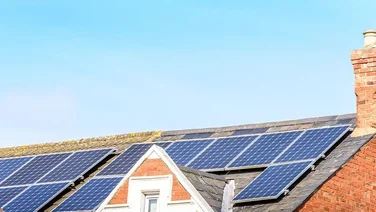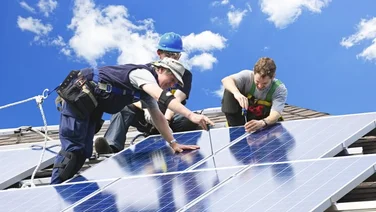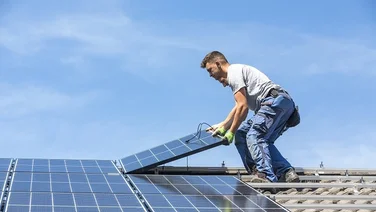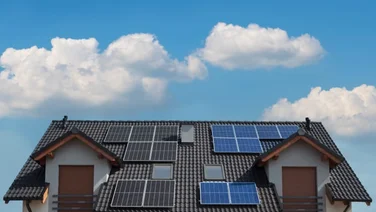We receive a small fee from trusted installers when you request a quote through our site. This helps us keep our content independent, well-researched and up to date – Learn more
- The environment was a huge talking point ahead of the 2024 election
- Renewable energy is a priority for most parties, particularly solar power
- The Conservatives and Labour want to keep some areas of North Sea oil and nuclear power
- The Green Party promised the most money to fight climate change

The environment was one of the major talking points of the 2024 General Election, with most of the parties promising to spend big amounts on renewable energy.
It is particularly important in the context of the cost-of-living crisis as the price of energy has put severe pressure on household bills.
The Conservatives, Labour, the Liberal Democrats, the Green Party and the Scottish National Party (SNP) have all committed huge amounts of money to either lessen the UK’s reliance on fossil fuels or get rid altogether and get the country to net zero.
Some of the most eye-catching promises include:
- Launch a new national energy company to cut energy bills – Labour
- Spend £40 billion to completely decarbonise the UK – Greens
- Treble the UK’s wind energy capacity and make it energy independent – Conservatives
- Make 90% of the UK’s energy renewables based – Liberal Democrats
- Completely transition away from North Sea oil and gas – SNP
The parties, with the exception of Reform UK, recognise the importance of cutting carbon and how this affects people’s household energy bills.
Where do you want to install solar panels?
Get startedClimate change has become a huge issue in recent times
Solar energy
Renewables will be critical if the UK is to get to net zero, solar energy in particular. All the parties that take the climate crisis seriously have put forward plans to improve renewable energy capacity.
Earlier in June, Solar Energy UK set out plans to make solar energy affordable for low-income households and work with the government on investment, jobs and the national network as part of a post-general election roadmap to help the UK achieve its green targets.
In its Solar and Energy Storage Manifesto the industry body said the UK needs to increase its solar energy and zero-carbon energy storage capacities, by 2030 to 50GW and 30GW respectively, if it is going to end its reliance on fossil fuels.
It also called upon the government to make substantial changes to its domestic market, such as making it easier to invest, plan and work in the solar energy industry.
Reacting to the political manifestos, Solar Energy UK said it was pleased to see consensus on improving renewable energy capacity, particularly Labour with the goal of trebling solar capacity by 2030, and the Liberal Democrats pursuing 90% renewables by 2030.
“It was also pleasing to see more mentions of storage, and the vital role it must play in our energy system going forward,” the industry body said.
Furthermore, it urged the next government to remove the barriers to solar, storage and other renewable energy technologies.
“The appetite for investment is still here, but we mustn’t let it slip through our fingers.”
Another consistent theme is the concept of energy independence, the idea being that the UK, which imports most of its fuel, should aim to create its own sources of power and not be vulnerable to geopolitical crises.
Every party, again with the exception of Reform UK, have pledged to pursue energy independence in one way or the other.
Achieving energy independence would be a fundamental change in how the UK is powered, and the country’s long term green future may well depend on it.
There is also consistency on how the parties understand the importance of solar energy, but there is a clear dividing line between policies that support solar energy projects and those that don’t.
Beyond the big promises, let’s take a look at what the parties have promised.
We’ve also looked at each party’s manifesto in more detail from an environmental perspective:
Conservatives
The Conservatives’ biggest focus has been energy independence, essentially to stop geopolitical crises such as the Russia-Ukraine war sending energy bills skyrocketing.
If elected again, the party has promised to prioritise household bills over what it calls “unaffordable eco-zealotry”, and it has ruled out any further green levies, a policy it believes will bring down energy bills in each year of the next parliament.
Furthermore, it has promised to launch a £6 billion energy efficiency voucher scheme to help consumers install solar panels and other cost-saving technology, such as heat pumps.
Other renewable interests include offshore wind power, and the party has said it wants to treble the UK’s capacity.
However, despite this, there is very little in their manifesto it would work with the solar industry to push solar panel installations.
The party would also continue to prioritise farming over solar power projects, stating outright that the best agricultural land will not be used for solar farms, meaning the industry is unlikely to be a long term priority for the party.
On fossil fuels generally, the Conservatives still believe in fossil fuel industries such as oil and gas. Unlike some of the other parties, it wants to continue to support North Sea oil, which it considers to be a vital source of home-grown energy.
It also wants to keep nuclear power with two new fleets of Small Modular Reactors, which again it sees as part of its energy independence strategy.
Environmental rating: 2/5
“With our plan we will produce enough electricity to both meet our domestic needs and export to our neighbours”
– Rishi Sunak, Leader, Conservative Party
Labour
The Labour Party’s position is similar to the Conservatives’ in that they are placing a huge emphasis on lowering household bills.
The party’s most headline-grabbing policy is Great British Energy, a new national energy company that it says will guarantee low energy bills.
The company, which will be in Scotland, will “create jobs and build supply chains in every corner of the UK” the party says.
Great British Energy will initially be capitalised with £8.3 billion and it will work with the private sector and trade unions to invest in renewable technologies and deliver clean power, according to Labour.
Labour has also promised a raft of grants and low interest loans to help people lower bills through installing solar panels and insulating their homes as part of what it calls its Warm Home Plan,, and it has put aside £6.6 billion to spend on this between now and 2030.
However, it is unclear how these grants and loans will differ from those that already exist and if they will offer more to people struggling to afford the upfront cost.
This is in contrast to the Liberal Democrats, which has promised to provide free insulation and heat pumps to low-income households, and also the Conservatives Party with its solar power voucher scheme.
While filled with big ideas and seemingly more far-reaching than the Conservatives’ plans, Labour’s environmental strategy lacks specific detail as to how it will help people cut their bills and get the country to net zero.
Environmental rating: 3.5/5
“Labour will work with the private sector, including banks and building societies, to provide further private finance to accelerate home upgrades and low carbon heating.”
– Labour Party manifesto
Where do you want to install solar panels?
Get startedLiberal Democrats
The Liberal Democrats’ plans for helping households cut energy bills hinges on solar power, and it is promised a ‘solar revolution’ to end fuel poverty and turn the UK into a world leader in renewable technology.
The party has promised to expand incentives for households to install solar panels, including what it calls a “guaranteed fair price for electricity sold back to the grid”.
It will also remove what it calls the Conservative government’s “unnecessary restrictions on new solar and wind power” – meaning it will support solar farm projects – and it will aim to support investment in other renewable energies, such as tidal and wave power.
As well as that, it has promised to build more electricity interconnectors between the UK to guarantee the security of supply in an effort to avoid disruption to local communities.
Additionally, it will immediately start requiring all new homes and non-domestic buildings to be built to “a zero-carbon standard”, which includes being fitted with solar panels, and “progressively increasing standards as technology improves.”
All new homes will be zero carbon, and there will be free insulation and heat pumps for low-income households as part of what it calls a “ten-year emergency upgrade programme”, the party promises.
This upgrade programme will provide incentives for installing heat pumps that cover the real costs, although, similarly with the Labour Party’s plans, it is unclear how this particular project will differ from the present Boiler Upgrade Scheme.
Environmental rating: 4/5
“Climate change is an existential threat, soaring temperatures leading to wildfires, floods, droughts and rising sea levels are affecting millions of people directly, and billions more through falling food production and rising prices.”
– The Liberal Democrats manifesto
Green Party
The Green Party, unsurprisingly, have promised to spend the most money when it comes to decarbonisation and net zero.
In total, it has pledged £40 billion for what it calls the ‘Economic Green Transformation’, which it claims will drive out fossil fuels and make the UK economy green by the end of the next parliament.
This staggering amount of money includes an “unprecedented retrofit programme” to make homes warmer and cheaper to run, but the manifesto doesn’t include a clear timetable on this.
The Greens’ plans include delivering 80GW of offshore wind, 53GW of onshore wind, and 100GW of solar by 2035, as well as having 70% of the UK’s power.
It also wants considerable investment in energy storage capacity to create a “more efficient electricity distribution” and for communities to “own their own energy sources” so that they can profit from selling excess energy to reduce bills.
This emphasis on local communities is similar to the pledges from the Liberal Democrats, who have pledged to hand more power to local councils for more community-based net zero strategies.
Environmental rating 4.5/5
“The UK’s current climate targets do not reflect the urgency of the climate crisis. We would push the Government to transition to a zero-carbon society as soon as possible, and more than a decade ahead of 2050.”
– Green Party manifesto
Scottish National Party
The Scottish National Party’s (SNP) environmental policies are focused on using Scotland’s natural resources to cut carbon, but they are also wide-ranging, touching upon most areas of the economy, including mining, fishing, farming, private investment, the domestic supply chain and transportation.
It wants to turn Scotland into a “green energy powerhouse”, and its policies reflect that. However, as the SNP is only standing in Scotland, it is limited to what it can achieve with current devolution powers.
Therefore, its main underlying policy remains independence, as that it believes is the only thing that can help Scotland decarbonise and realise its renewable energy potential.
Crucially, it also wants Westminster to spend £500 million to support the transition away from North Sea oil, matching what it has said it has committed.
However, the SNP has not given clarity over where the people currently employed in that sector would work, or what type of work they would do.
Specifically, it wants Westminster to “ensure fair funding flows to the devolved nations” to enable the whole of the UK to be net zero by 2050.
Additionally, for the whole of the UK to reach net zero, each country needs to agree and coordinate their policies, according to the SNP.
To that end, the party has called for Westminster to establish a ‘Four Nations Climate Response Group’ to stop the UK government backtracking on its environmental goals.
The UK government claims there are as many as 200,000 people employed in North Sea oil and gas, although this is disputed by environmental MPs and groups who say it could be less than 30,000.
It could be assumed these workers would be integrated into renewable energy, but this isn’t entirely clear as the SNP has not explicitly committed to another energy source, such as solar or wind.
Environmental rating: 4/5
“The SNP believe the best pathway to net zero and secure, affordable and clean energy is through significant growth in renewables, storage, hydrogen and carbon capture. Scotland is well placed to supply significant amounts of hydrogen to continental Europe.”
– SNP manifesto
Will a change in government make any difference to the environment?
According to The Eco Experts 2024 National Home Energy Survey, 62% of the general public do not believe that political parties are doing enough to reduce climate emissions.
This dissatisfaction shows an important gap between public expectations and perceived political action and suggests a strong demand for more effective climate policies from political leaders is needed.
When asked if a change in government would have a positive impact on reducing carbon emissions, 28% of respondents said yes, 39% said no, and 33% were unsure.
For more information on public opinion on government schemes and incentives, as well as views on green technology and environmental concerns, download the 2024 NHES here.
Has the new government done anything to help the environment?
Since its landslide victory in July 2024, the Labour government has announced a number of initiatives to help the UK’s net-zero plans.
It has continued with plans to launch Great British Energy as part of its efforts to achieve energy independence and it has launched the Warm Homes Plan, an initiative designed to help low-income households benefit from LCT.
It has also increased funding for the Boiler Upgrade Scheme – about £50 million – in September 2024 after a boom in demand.
The government’s plans will be vital to getting the UK to net zero, as currently 1-in-4 people are unaware of the existing grants available.
National Home Energy Survey 2024
Read the full findings from this year’s report by downloading the PDF here
Summary
- The environment is a huge talking point in the 2024 election and will more than likely dominate the next parliament
- The climate crisis is linked directly to the cost-of-living crisis, and most of the parties recognise that without solving one, it is near impossible to solve the other
- The Green Party have committed the most money to achieving net zero
- The Liberal Democrats are promising a solar revolution and to have 90% of the UK’s energy from renewable sources.









